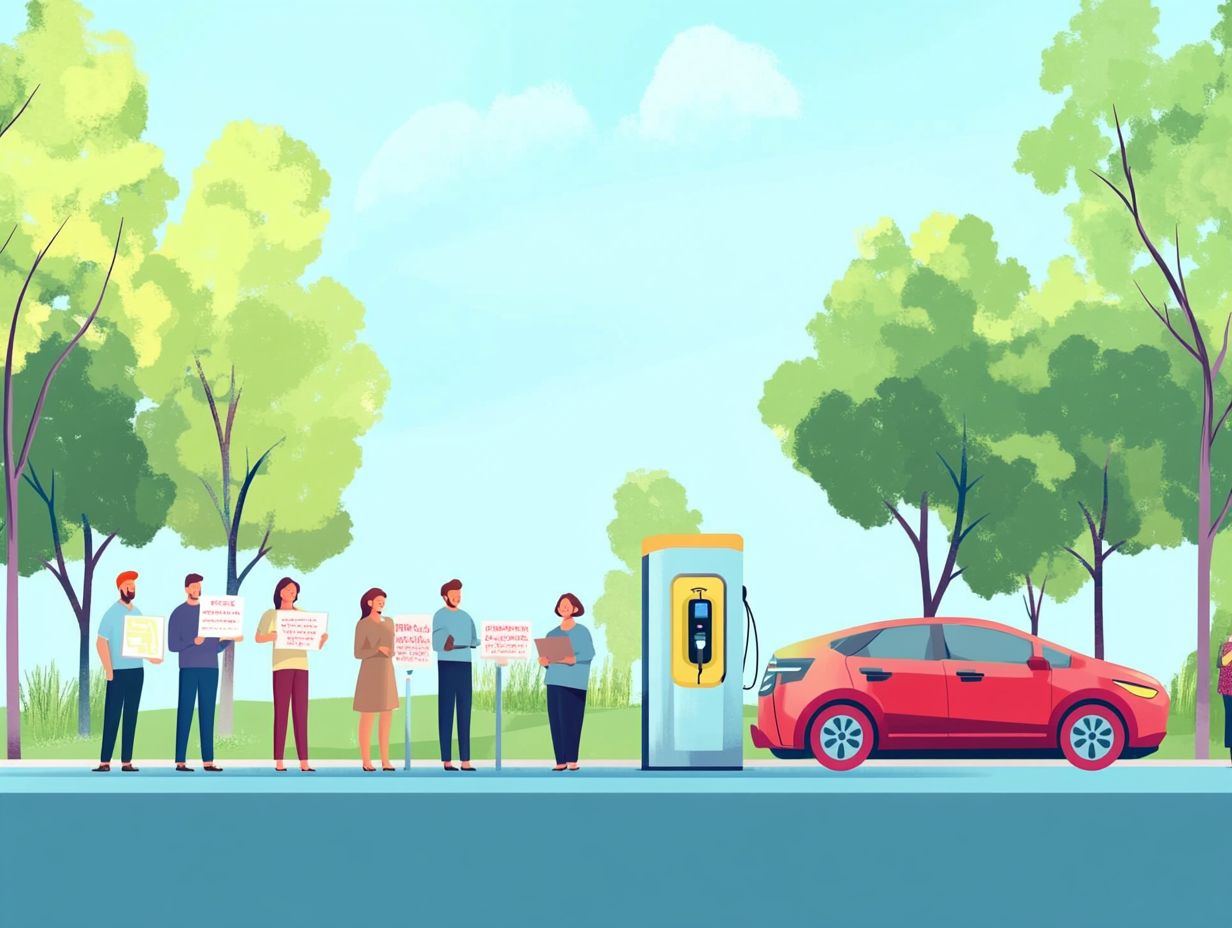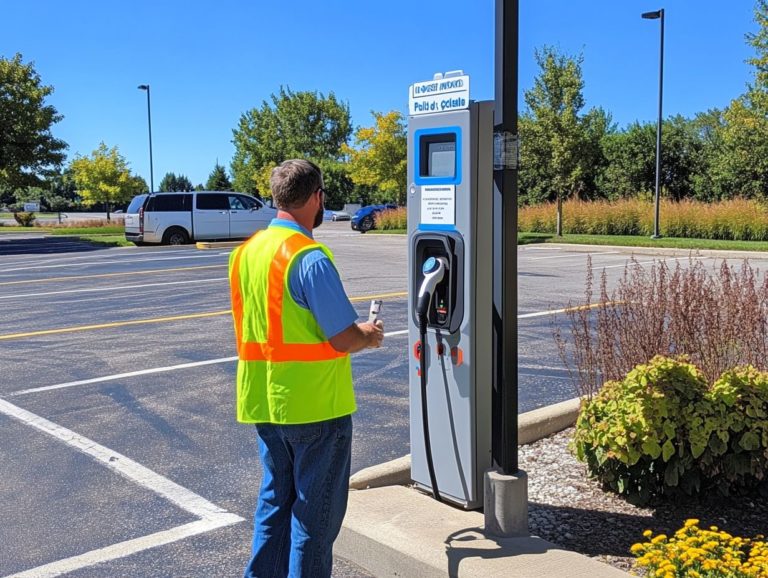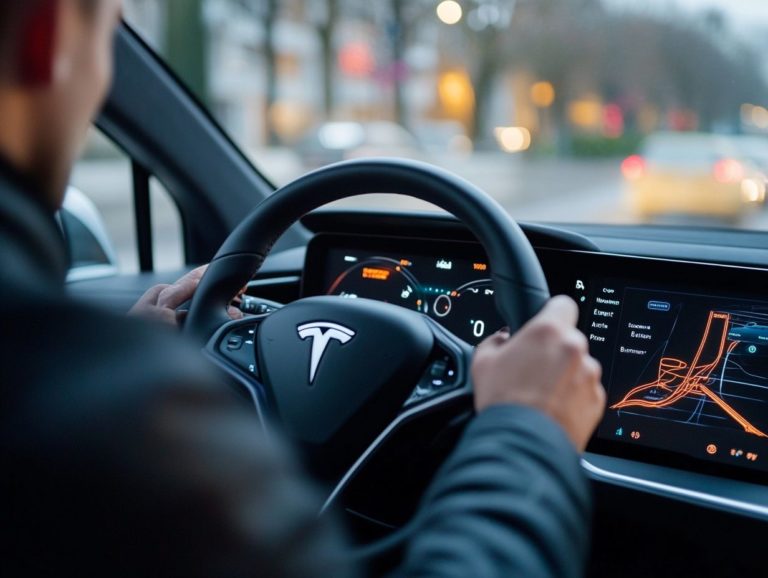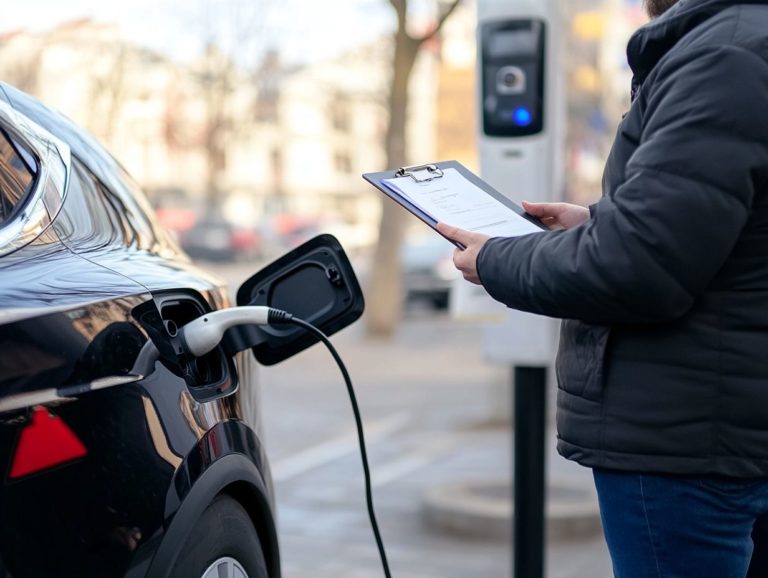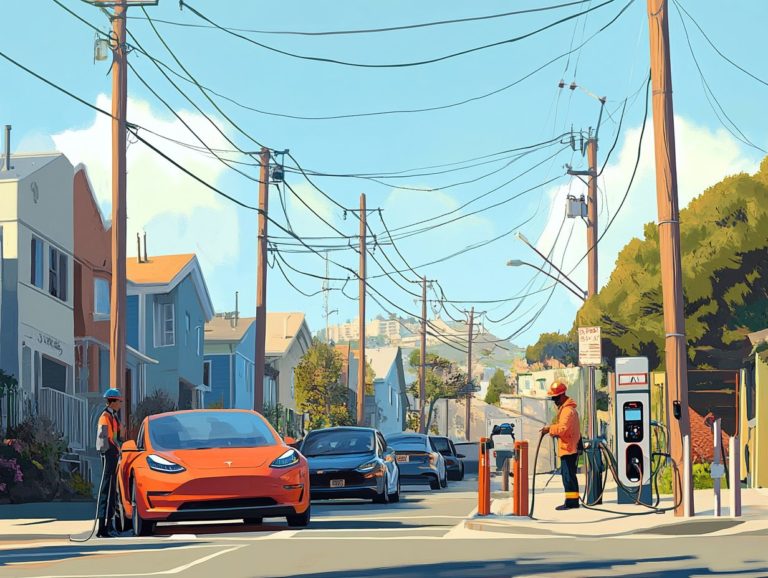what are the common misconceptions about evs?
Electric vehicles (EVs) are changing the automotive world. However, many myths still cloud their real benefits.
This article will clear up common myths about EVs. We ll share facts to help you understand their true benefits.
It also explores advancements in EV technology. You ll see how embracing electric vehicles can benefit you more than you think.
Contents
- Key Takeaways:
- What are EVs?
- Common Misconceptions About EVs
- Debunking the Misconceptions
- The Future of EVs
- Frequently Asked Questions
- What are the common misconceptions about EVs?
- Are EVs less powerful than traditional gas-powered cars?
- Do EVs have a limited range and require frequent charging?
- Are EVs more expensive than gas-powered cars?
- Is it true that EVs are not environmentally friendly?
- Do EVs take a long time to charge?
- Are EVs not as safe as traditional cars?
Key Takeaways:
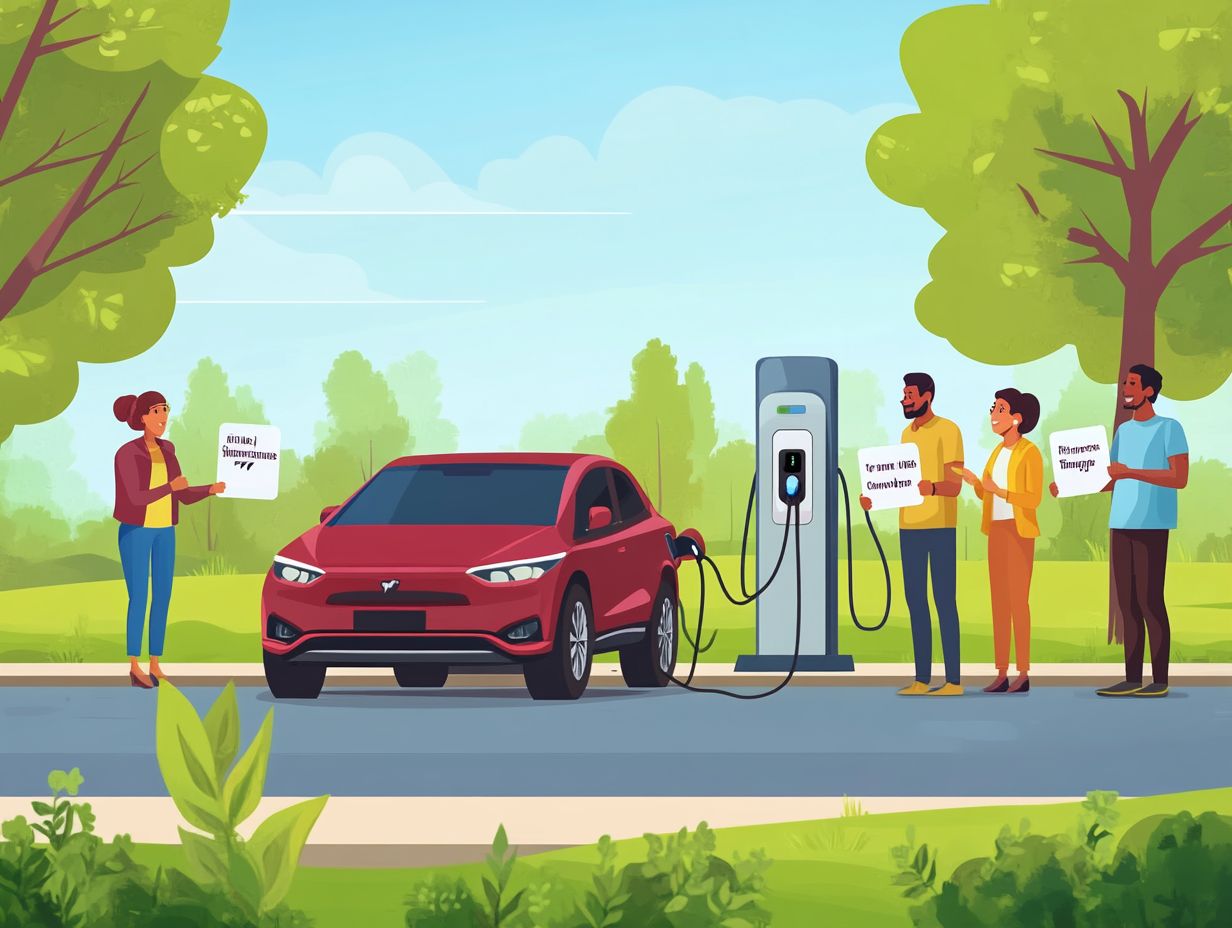
EVs are not just slow, expensive, and environmentally detrimental – they are cost-effective, powerful, and eco-friendly alternatives to traditional vehicles.
The common misconceptions about EVs can be debunked by addressing concerns about their performance, maintenance costs, driving range, charging time, and environmental impact.
With constant advancements and potential to reduce carbon emissions, the future of EVs is bright, and they may become the preferred mode of transportation in the coming years.
What are EVs?
Electric vehicles (EVs) represent a groundbreaking advancement in transportation. They dramatically lower your carbon footprint by using clean energy sources like wind or solar instead of traditional gasoline.
With significant strides in battery technology and charging infrastructure, EVs have become a practical choice. They offer zero-emission vehicles that play a crucial role in curbing greenhouse gases and tailpipe emissions.
With more plug-in hybrids and electric models like Tesla and Nissan Leaf hitting the market, switching to a sustainable future is not just possible it s happening now!
Common Misconceptions About EVs
Electric vehicles are becoming popular, but many people still hold onto misconceptions. Let s tackle these myths and help you make the switch from gasoline cars.
Misunderstandings about their power, affordability, and environmental impact can understandably create some hesitation. Addressing these top electric vehicle myths is crucial for revealing the genuine advantages of EVs.
You’ll discover benefits such as lower emissions and enhanced vehicle safety, both of which play a significant role in fostering a cleaner environment.
Misconception #1: EVs are not as powerful as traditional vehicles
One of the most widespread misconceptions about electric vehicles (EVs) is the belief that they lack the power and performance of traditional gasoline vehicles. This couldn’t be further from the truth.
In fact, many EVs are equipped with advanced electric motors that provide instantaneous torque. This results in impressive acceleration and responsiveness that can outshine many gasoline cars regarding power and overall driving experience.
Take the Tesla Model S Plaid, for example; it boasts a jaw-dropping 0-60 mph time of just under two seconds, putting it in league with the most elite supercars. The Porsche Taycan also exemplifies this trend, offering not just lightning-fast acceleration but extraordinary torque delivery, giving drivers an exhilarating experience with every press of the pedal.
With these remarkable technological advancements, it’s evident that EVs are not just catching up they are, in many instances, outpacing their gasoline counterparts in delivering a thrilling driving experience thanks to cutting-edge engineering and innovative design.
Misconception #2: EVs are more expensive to maintain
You might think maintaining an electric vehicle (EV) costs more. But guess what? They often save you money in the long run.
Many believe that electric vehicles (EVs) are pricier to maintain than gasoline cars. In reality, EVs often prove to be more cost-effective over time.
With fewer moving parts and less frequent servicing needs, electric vehicles can drastically lower maintenance costs, providing you with reliable, low-cost transportation.
For instance, as an EV owner, you’ll appreciate not needing oil changes since electric motors don t rely on oil for lubrication. This small detail can save you anywhere from $100 to $200 each year.
Regenerative braking systems in EVs reduce brake wear. This means you ll replace brake pads less often than in gasoline vehicles.
Recent studies show that maintenance costs for EVs can be up to 50% lower over their lifespan compared to traditional vehicles. With fewer mechanical problems in general, it’s clear that EVs not only offer impressive longevity but also present a compelling case for being a more economical option in the long run.
Misconception #3: EVs have limited driving range
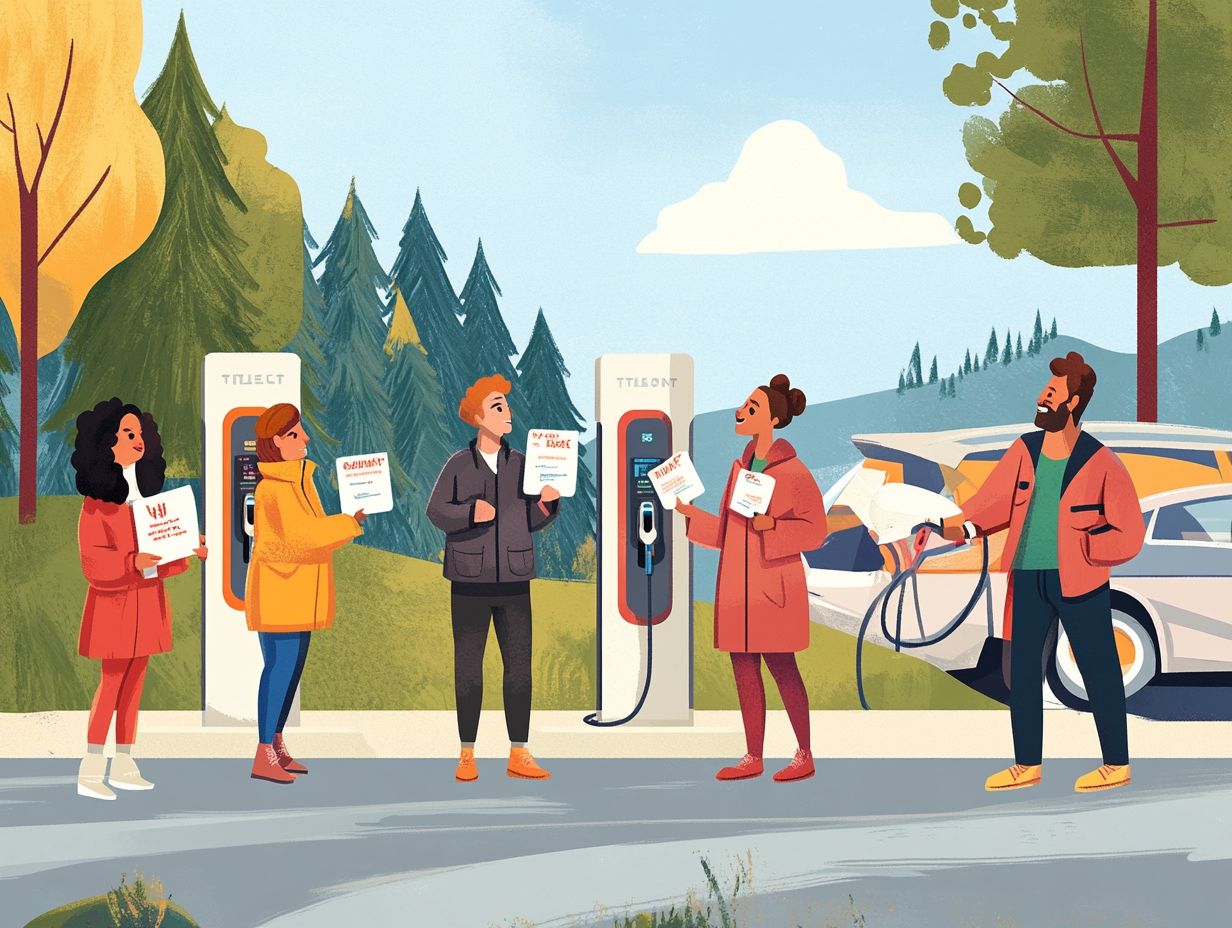
The notion that electric vehicles (EVs) are restricted by a limited driving range is a misconception, failing to recognize the remarkable advancements in battery technology and the increasing accessibility of charging stations.
In fact, many modern EVs offer ranges that rival traditional gasoline cars, effectively relieving concerns about running out of charge and making them ideal for both daily commutes and long-distance travels.
Consider the impressive innovations showcased in models like the Tesla Model S, which boasts a range of over 370 miles, and the Ford Mustang Mach-E, capable of reaching upwards of 300 miles on a single charge.
The expanding network of charging stations is transforming the EV landscape, giving you the power to have greater flexibility and confidence when planning your journeys.
With fast-charging technologies and strategic route planning, charging times are no longer a concern, significantly enhancing your overall experience. As the charging infrastructure continues to improve, perceptions of range are shifting, paving the way for increasing acceptance of electric vehicles among consumers like you.
Misconception #4: EVs take too long to charge
Many potential buyers of electric vehicles (EVs) might hesitate, held back by the misconception that charging takes too long compared to the quick refueling of gasoline cars.
However, with the emergence of fast-charging technology and the growing number of charging stations, you can charge your EV efficiently and conveniently often in less time than it takes to stop for gas.
With home charging, you can plug in your car overnight. This way, you wake up every morning with a full battery.
Public fast charging stations have also made impressive strides; some can provide over 80% charge in just 30 minutes.
Recent statistics reveal that the average charging time for a standard EV is now around 8-12 hours at home, but this can be significantly reduced when you tap into fast-charging networks.
These advancements not only ease range anxiety but also enhance the overall ownership experience, allowing you to seamlessly integrate charging into your daily routine.
Misconception #5: EVs are not environmentally friendly
The idea that electric vehicles (EVs) aren’t environmentally friendly is a common misconception. It overlooks the significant reductions in greenhouse gases and carbon pollution they can achieve, especially when powered by renewable energy sources.
Yes, battery manufacturing does raise some environmental concerns. However, if you look at the bigger picture, the overall lifecycle emissions of EVs are vastly lower than those of traditional gasoline cars.
Take a moment to consider the statistics: charging an EV with clean energy can reduce its carbon footprint by up to 70% compared to fossil fuel vehicles. That’s impressive.
Additionally, advancements in battery recycling technologies are paving the way for minimizing the environmental impact of discarded EV batteries. These innovations can recover up to 90% of valuable materials like lithium, cobalt, and nickel.
By embracing these sustainable practices, you extend the life of crucial resources and foster a closed-loop system that enhances the eco-friendliness of electric vehicles even further.
Harnessing the full potential of renewable energy and responsible recycling practices allows the EV sector to play a pivotal role in driving us toward a cleaner and sustainable future for transportation.
Debunking the Misconceptions
In this section, we will systematically debunk the prevalent misconceptions surrounding electric vehicles (EVs) by presenting compelling evidence and facts that illuminate their true capabilities and advantages over traditional gasoline cars.
By offering clear and concise information, the goal is to clarify these misconceptions and inspire more consumers like you to consider making the switch to a zero-emission vehicle.
Addressing the Concerns
Answering the questions of future electric vehicle (EV) owners is essential for alleviating doubts and leading to a sustainable future for transportation. You likely have questions about charging strategies, emissions reductions, and the practicality of owning an EV, and it’s important that these inquiries receive thorough, trustworthy answers to build your confidence in these innovative vehicles.
By grasping common concerns like the availability of charging stations or battery longevity you can make informed decisions. Advancements in charging infrastructure, including fast-charging options and a broader network of stations, are steadily easing the worries associated with range anxiety.
Plus, improvements in battery technology have dramatically boosted the durability and efficiency of EVs. This ensures they last longer and have a reduced environmental impact.
To facilitate a smoother transition to electric mobility, it s vital to engage in educational initiatives that empower you with knowledge about the benefits and technological advancements of EVs.
The Future of EVs
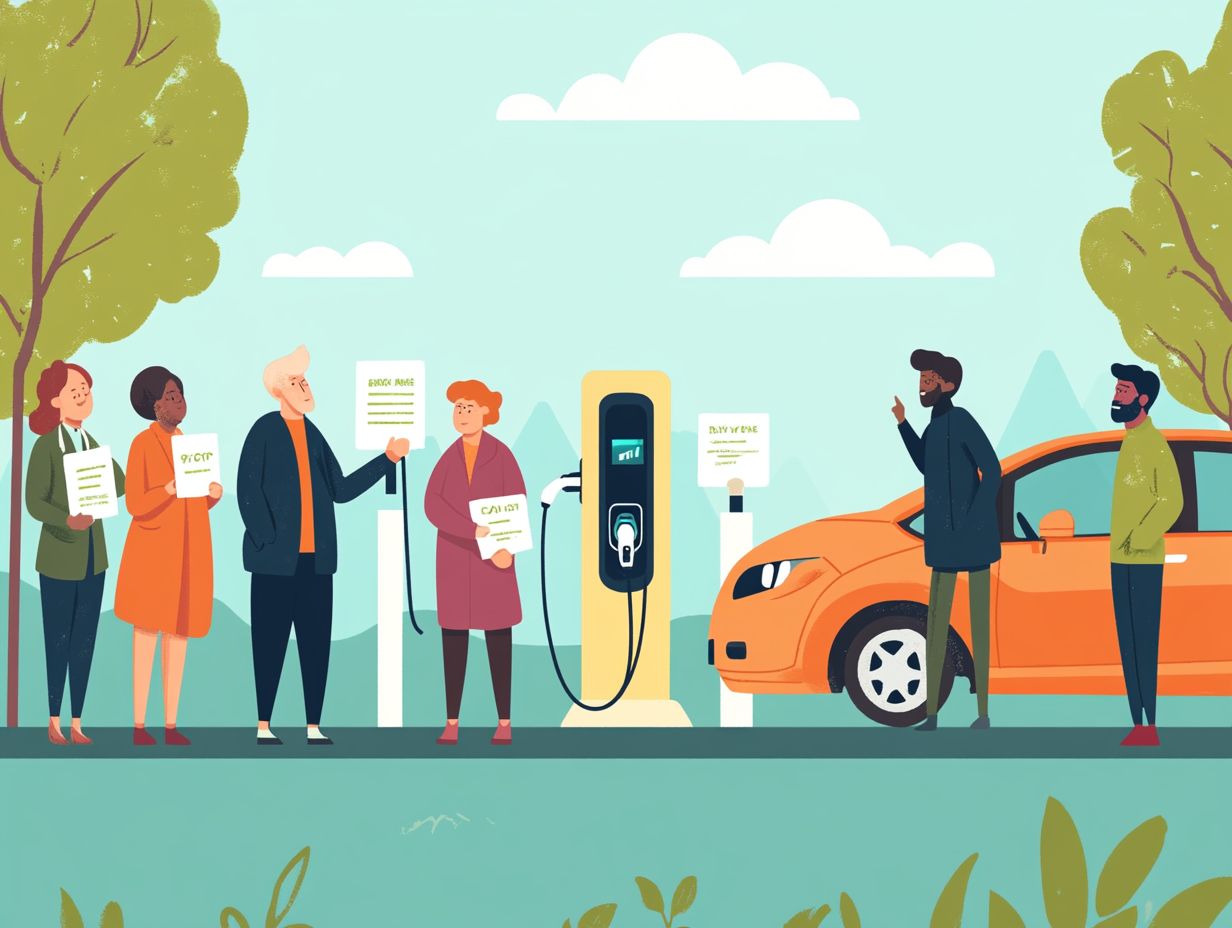
The future of electric vehicles (EVs) is on the brink of transformative advancements that will redefine the automotive landscape. This evolution is propelled by innovations in renewable energy and an enhanced charging infrastructure.
Get ready for exciting improvements in battery efficiency, expanded capabilities for EVs to send energy back to the grid, and an increasingly extensive network of charging stations. These developments will make EVs more accessible and practical for consumers around the globe, shaping a more sustainable driving experience.
Don t miss out on the future of driving!
Advancements and Potential Impact
Exciting advancements in electric vehicle (EV) technology are making your driving experience better and greener. These innovations are reducing emissions and fighting climate change.
New battery technologies and charging solutions are making EVs more efficient, affordable, and environmentally friendly. This progress is contributing to a sustainable future for transportation.
As the industry continues to enhance energy storage, you’ll discover newer batteries with higher capacities and faster charging times. This makes EVs increasingly appealing for consumers.
With more charging stations available, it s easier to find a place to charge your EV on longer trips. Smart charging solutions optimize energy use based on demand and rates, allowing for a seamless charging experience.
The integration of renewable energy sources into charging infrastructures is paving the way for a cleaner energy ecosystem. This significantly lowers the environmental impact of transportation.
Collectively, these advancements not only enhance consumer adoption but also signal a transformative shift towards a greener future. This aligns perfectly with global goals to mitigate climate change.
Frequently Asked Questions
What are the common misconceptions about EVs?
The common misconceptions about EVs include:
- EVs are not as powerful as traditional gas-powered cars.
- EVs have a limited range and require frequent charging.
- EVs are more expensive than gas-powered cars.
- EVs are not environmentally friendly.
- EVs take a long time to charge.
- EVs are not as safe as traditional cars.
Are EVs less powerful than traditional gas-powered cars?
This is a common misconception. In reality, many EVs have comparable or even greater horsepower than traditional cars. They also have the ability to accelerate quickly.
Do EVs have a limited range and require frequent charging?
While early models of EVs had limited range, newer models can travel over 300 miles on a single charge. With the growing availability of charging stations, it s becoming easier to charge your EV on longer trips.
Are EVs more expensive than gas-powered cars?
While EVs may cost more upfront, they save you money in the long run when considering lower fuel and maintenance costs. This makes them more cost-effective over time.
Is it true that EVs are not environmentally friendly?
This is another misconception. While it s true that the production of electricity for charging can contribute to emissions, EVs emit significantly less greenhouse gases compared to gas-powered cars. They also do not emit any pollutants from the tailpipe.
Do EVs take a long time to charge?
EVs do take longer to charge than filling up a gas tank. However, advancements mean that newer EVs can be charged up to 80% in as little as 30 minutes at certain fast-charging stations.
Are EVs not as safe as traditional cars?
This is a common misconception as well. EVs must pass the same safety tests and standards as traditional cars. Moreover, the absence of a gas tank and engine may even result in a lower risk of fires in accidents.

